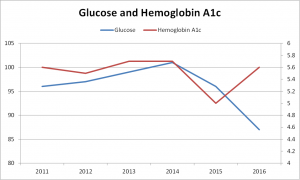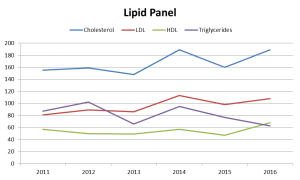Over the past couple of years, I’ve come to believe that refined sugars are one of the worst things we can put into our bodies. When you investigate the nutritional value of sugar, high fructose corn syrup, and other sweeteners, you find that it’s zero, if not negative. These sweeteners are used to enhance food flavor and are highly addictive. They also create resistance to hunger suppressing hormones in the body resulting in the never-ending hunger cycles and insatiable pantry raids almost all of us have experienced. Food companies understand the flavor enhancement and addictive nature of the substance and employ food chemists to optimize the level of added sugars. Their job is to determine the right amount of sweetener to add that enhances flavor but doesn’t make it too sweet for our tastes. If you don’t believe it, just look at the amount of sugar per serving in something as benign as tomato sauce. Then start looking at nearly every processed or packaged food. If you’re eating it from a box or a bag, there’s a very high probability that some sweetener has been added to it.
With this in mind, about 18 months ago I decided it was to take a stand against sugar. I didn’t eliminate all sugar, but I significantly cut back on how much sugar I consumed on a daily basis. I cut out my morning packaged orange juice routine, starting making homemade tomato sauce (which tastes way better than what you get out of a jar), and became aware of the sugar content of everything I was eating. When you start reading labels, you’re floored by how many things have sugar in them. Even things you would never suspect contain sugar, such as a box of whole grain crackers, have some type of sweetener added.
What inspired me to run this experiment? I wanted to see if it would have any affect on my weight. It’s not that I was overweight, but I felt like I could afford to lose 5-10 pounds to get to a more optimal weight for my body type. I also wanted to see how it would affect my blood test results. Luckily, I decided to start having blood tests done annually when I turned 40, so I had six years of results to compare against.
Here are the results from 18 months of limited sugar, and what’s next.
Before proceeding into the results I achieved by limiting my sugar intake, let’s be clear that this is not medical advice. These results are specific to me and how my body responded to my “experiment”. Since everybody’s body chemistry and physiological response is different, your experience may not be the same.
Weight
Let’s start with weight. As I mentioned, when I started my experiment, I wasn’t overweight. My weight fluctuated between 165 and 170. Sometimes it would bounce up to 172 or so, but I couldn’t get it under 165. For my height, my BMI was around 24, which is considered the higher end of the normal range (normal being 18.5 – 24.9 according to NIH).
My goal for years was to get to a fighting weight of 160, which seemed impossible given that I couldn’t break 165 no matter what I tried for my workouts. Therefore, I decided that diet would be the next route to try.
I started to reduce my sugar intake in November 2015. It took about 60 days, and then I started seeing results in February. I had finally managed to break 165 pounds and could consistently keep my weight there. Instead of bouncing between 165 and 170, my weight would fluctuate between 160 and 165. The results were encouraging and motivated me to stick with it.
By the summer, I had achieved my goal of hitting my fighting weight of 160 pounds. From last summer until the beginning of this year, my weight fluctuated +/- 2 pounds around 160. Then, in March of this year, I decided to reduce my intake of carbohydrates. I’ve since been able to shave a couple of more pounds off, and now my weight is consistently in the 155 – 160 range.
While it’s only 10 pounds lost, I feel great at my new weight. I also like that I did it in a controlled, healthy manner. At my new weight level, my BMI is 23, which is still at the higher end of the range, but not nearly as close to the edge.
At this point, I’m not looking to drop any more pounds, but I intend to maintain my new diet habits. If a few more pounds melt off in the process, then so be it.
Blood test results
While weight was one concern I had regarding sugar, I was more concerned with my blood test results over the last six years. Some of my diabetes indicators, specifically Glucose and H1ac, were right at the limits of what was considered normal. While everything felt good on the outside, I was concerned about what damage may be happening on the inside that I couldn’t see. Since there is also a history of diabetes in my family tree, I thought it would be wise to take a more aggressive stance against sugar to get my numbers under better control.
Glucose and Hemoglobin A1c
 On average, I work out between 3-5 days a week, walk with my dog about 50-60 miles a month, and had been doing all of the recommended diet things. We all know what they are – limit fats, lots of healthy whole grains, and plenty of fruits and vegetables. Since I wasn’t overweight either, I wondered why my glucose levels were hovering around the 100 mark, and rising (see graph right). I was also concerned that my Hemoglobin A1c numbers were bordering on pre-diabetic levels.
On average, I work out between 3-5 days a week, walk with my dog about 50-60 miles a month, and had been doing all of the recommended diet things. We all know what they are – limit fats, lots of healthy whole grains, and plenty of fruits and vegetables. Since I wasn’t overweight either, I wondered why my glucose levels were hovering around the 100 mark, and rising (see graph right). I was also concerned that my Hemoglobin A1c numbers were bordering on pre-diabetic levels.
Reducing my sugar intake helped me get my blood sugar back under control in 2015 and reverse the steady gains I had been seeing. There was even more dramatic improvement this year to a level that I hadn’t seen before. In addition to the sugar reduction, I attribute a lot of the change to my reduction of carbohydrates and wheat-based products, such as bread, from my diet in March.
The Hemoglobin A1c numbers were a little disappointing. They were down in 2015, but up this year. Bottom line, the number is just higher than I like it, and higher than it should be. I’m wondering how much of that is due to the fact I’ve only recently reduced my carb intake. I want to give these numbers another year to see what direction they go after I’ve put more emphasis on reducing my carbohydrate intake.
I’m now very curious as to what next year’s number will be. Will the glucose numbers stay where they are, and will the Hemoglobin A1c numbers prove this year to be an anomaly?
Lipid Panel
 My lipid panel has shown good improvement over the last two years. I had a noticeable improvement last year from reducing my sugar intake, and the improvements continued this year. Some of this year’s improvement may be related to reduction in carbs, but I believe it’s too early to tell. It needs another year to know for sure.
My lipid panel has shown good improvement over the last two years. I had a noticeable improvement last year from reducing my sugar intake, and the improvements continued this year. Some of this year’s improvement may be related to reduction in carbs, but I believe it’s too early to tell. It needs another year to know for sure.
The biggest improvements in my lipid panel were the reduction in triglycerides and the increase in my HDL numbers. I’m not too concerned about my overall cholesterol increase, as it’s still well within normal levels. I’m happier that HDL’s are making up a higher percentage of the overall cholesterol number.
It will be interesting to see what happens over the next year. The question I have is if these numbers have hit a floor and will fluctuate around a new normal, or if these numbers are just normal fluctuations that may occur from year-to-year.
What’s next
My goal is to maintain the new diet for the next year to see if my numbers continue to improve, especially the Hemoglobin A1c, if they stabilize, or if they just fluctuate around this year’s results, which I’d be fine with. Bottom line, I want to continue watching my diet carefully, as I’ve become convinced that working out is not the answer to staying healthy. It’s a big component, but diet is the more dominant factor.
Overall, regardless of the numbers, I’m enjoying the new diet. I feel as though I’m eating much healthier. I’m finding it much easier to control my appetite. Mid-morning hunger pains have been reduced or gone away. I’m not experiencing mood swings when I get hungry, and my hunger pains feel different. It feels like I need to eat a little something, not like I need to mow through an entire bag of chips to feel full. I also find that a meal lasts longer before experiencing a hunger for the next one. This fact alone makes me want to stay the course.
I’m looking forward to running the tests again next year. It’ll be interesting to see what happens.

Pingback: 2016 blog review, 2017 blog goals - Gregg Borodaty